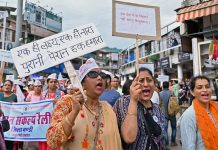 Constitution of India, as framed envisaged the Supreme Court, as the highest court has a very wide appellate jurisdiction over all Courts and Tribunals in India in as much as it may, in its discretion, grant special leave to appeal under Article 136 of the Constitution from any judgment, decree, determination, sentence or order in any cause or matter passed or made by any Court or Tribunal in the territory of India.
Constitution of India, as framed envisaged the Supreme Court, as the highest court has a very wide appellate jurisdiction over all Courts and Tribunals in India in as much as it may, in its discretion, grant special leave to appeal under Article 136 of the Constitution from any judgment, decree, determination, sentence or order in any cause or matter passed or made by any Court or Tribunal in the territory of India.
Apart from its exclusive original jurisdiction extending to all cases between the Government of India and the States of India or between Government of India and states on one side and one or more states on other side or cases between different states, it also had the privilege to render advise to the President under its advisory jurisdiction. Under Article 32 of the Constitution gives an extensive original jurisdiction to the Supreme Court in regard to enforcement of Fundamental Rights. It was empowered to issue directions, orders or writs, including writs in the nature of habeas corpus, mandamus, prohibition, quo warranto and certiorari to enforce them.
The public interest litigation is the product of realization of the constitutional obligation of the court and is a cooperative or collaborative effort by the petitioner, the State of public authority and the judiciary to secure observance of constitutional or basic human rights, benefits and privileges upon poor, downtrodden and vulnerable sections of the society. Whether similar jurisdiction exists in other countries or this is an indigenously developed jurisprudence? The public interest litigation is an extremely important jurisdiction exercised by the Supreme Court and the High Courts. The High Courts followed this Court and exercised similar jurisdiction under article 226 of the Constitution.
As the time rolled by, the courts expanded the meaning of right to life and liberty guaranteed under article 21 of the Constitution. While the rule of locus standi was diluted and the traditional meaning of `aggrieved person’ was broadened to provide access to justice to a very large section of the society which was otherwise not getting any benefit from the judicial system, it was also kept in view that the judicial process, if not checked, will be reduced to a charade, if disputes beyond the ken of legal parameters occupy the judicial space, thus causing grave danger to the credibility of the judicial process.
This judge made concept called ‘Public Interest Litigation’, on the positive side, was instrumental in developing an entirely novel environmental jurisprudence, thus beneficially affecting the present generation as well as the future in several matters of public importance through several landmark judgements. This concept is unique to the Supreme Court of India only and perhaps no other Court in the world has been exercising this extraordinary jurisdiction.
Although the proceedings in the Supreme Court arise out of the judgments or orders made by the Subordinate Courts including the High Courts, but of late the Supreme Court has started entertaining matters in which interest of the public at large is involved and the Court can be moved by any individual or group of persons either by filing a Writ Petition at the Filing Counter of the Court or by addressing a letter to Hon’ble the Chief Justice of India highlighting the question of public importance for invoking this jurisdiction.
Public interest litigation is not in the nature of adversary litigation but it is a challenge and an opportunity to the government and its officers to make basic human rights meaningful to the deprived and vulnerable sections of the community and to assure them social and economic justice which is the signature tune of our Constitution. It is a part of the process of participative justice. This jurisdiction has been created and carved out by the judicial creativity and craftsmanship.
The Supreme Court broadened the traditional rule of standing and the definition of “person aggrieved”. Such concept is popularly known as ‘Public Interest Litigation’ and several matters of public importance have become landmark cases. This concept is unique to the Supreme Court of India only and perhaps no other Court in the world has been exercising this extraordinary jurisdiction. The important innovation in the matter of PIL is relaxation regarding locus standi. Though no hard and fast rules have been laid down in S.P.Gupta and others Vs U.O.I and others, popularly known as Judges transfer case the supreme court elaborately stated the rule in this regard.
In 1981 the Supreme Court opined that our current processual jurisprudence is not of individualistic Anglo-Indian mould, but is broad-based and people-oriented, and envisions access to justice through ‘class actions’, ‘public interest litigation’, and ‘representative proceedings’. Later in 1984 the Supreme court entertained a petition even of unregistered Association espousing the cause of over downtrodden or its members observing that the cause of “little Indians” can be espoused by any person having no interest in the matter.
What Justice Sarkaria had observed in 1976 seems to have come true now. A particular set of individuals masquerading as activists/crusaders for justice to the down trodden, as pro bono publico defenders of the constitutional morality, gender justice, self appointed custodians of secularism, keep on inventing novel situations to file PILs and interfere in things which even remotely do not concern them. They indulge in the pastime of meddling with the judicial process either by force of habit or from improper motives. They pretend to act in the name of pro bono publico, though they have no interest of the public or even of their own to protect. Often, they are actuated by a desire to win notoriety or cheap popularity; while the ulterior intent of some applicants in this category, may be no more than spooking the wheels of administration.
The Apex Court and the High Courts are flooded with litigations and are burdened by arrears. An avalanche of misdirected, frivolous or motivated petitions, purportedly filed in the public interest, which upon due scrutiny, are found to promote a personal, business or political agenda have spawned an industry of vested interests in litigation. It is a travesty of justice to fritter away the precious resources of the legal system in this callous manner. In a catena of cases, the Apex Court itself has pithily called PILs as ‘publicity interest litigation’, ‘private interest litigation’, or ‘politics interest litigation’ or the latest trend ‘paise income litigation’. Much of PILs are really a blackmail tactic. The courts had to restrict the free flow of such cases in the name of public interest litigations, lest the traditional litigation suffers and the courts of law, instead of dispensing justice, will have to take upon themselves administrative and executive functions.
Much to the chagrin of all concerned who have waited in the queue for years for their cases to come on board for final adjudication by the constitutional courts, this benign concept in the course of time, seems to have deprecated into an uncontrollable Frankenstein and a nuisance, which is threatening to choke the dockets of the superior courts much like the infamous Cuscuta reflexa, the giant dodder (or amar vel in Hindi) is a species in the genus Cuscuta. This plant common in the Indian Subcontinent, is very familiar site for all in Indi, who see a leafless twined sprawling thin vine thriving over a host plant (generally the ber or litchi plants). This species produces numerous branches which cover the host plant within a very short period of time and suck life out of the host plant.
On 21 April 2020, the Supreme Court Dismissed a PIL Seeking GST Exemption For Face Masks & Sanitizers, while observing that the petitioner was no expert on the issue and could not determine prices. The Court pulled up the petitioner and warned that they would impose costs for filing such PILs which waste the Court’s time. Earlier on 3r April in a PIL case heard by the Top Court, the Solicitor General had stated that “PIL Shops must close down till the country emerges out of this crisis. Preparing PILs without any ground level information or knowledge while sitting in an air-conditioned office was not ‘public service”.
Earlier a plea by Swami Agnivesh seeking immediate relief for the poor during the Coronavirus crisis came up for hearing. It was pleaded that the lockdown had created a huge crisis and that there was no real groundwork being done as against what the government was claiming. Opposing such pleas the government counsel called it a self employment generating petitions and that social work was now only confined to filing Public Interest Litigations from the comfort of their homes.”
Under our jurisprudence, neither the Constitution nor any other law, substantive or procedural, envisages this “short-circuit-parachute-landing” jurisdiction of the constitutional courts, which I prefer to call as the “Parachutists in Legalis-ratio”, which emanates from judge made enlargement of writ jurisdiction under Articles 32 and 226, has now overshadowed almost all the constitutionally desired functions of these courts. Since this PIL jurisdiction is purely a creature of the judge’s discretion, therefore, a heavy onus lies on the sagacity of our Judges of the Constitutional Courts to see that the law, which they have sworn to uphold, does not get mired down in this PIL imbroglio while those who defy it go scot free, and those who seek its protection lose hope.
Under the envoirnmental jurisprudence, the courts force the polluters to pay for their sins, similarly all the so called “Self Employment Generating” or ‘Publicity Interest Litigants’, or ‘Private Interest Litigants’, or ‘Politically Interested Litigants’ or ‘Paise Income litigants or Parachutists in Legalis-ratio, be ruthlessly dealt with in the interests of justice, equity and good conscience towards the citizens at large. A benign jurisdiction created and carved out by judicial creativity and craftsmanship for the benefit of the poor and downtrodden has been transformed into a tool of blackmail and unjust enrichment by few unscrupulous operators, who are well entrenched in the portals of justice and specialize in barratry to fill their coffers. Such pathogens in the legal system urgently need sanitization by the sagacious judiciary. Let all the “Amar Vels” (cascuta reflexas) of the legal system be cleared with an iron hand once for all.
letters@tehelka.com













